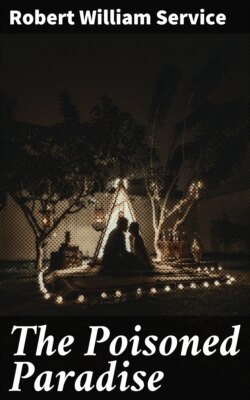Читать книгу The Poisoned Paradise - Robert William Service - Страница 23
На сайте Литреса книга снята с продажи.
3.
ОглавлениеHow hard that first winter was! Fifty pounds went much further in those days than it does now, but even then he had to go without many needful things. An overcoat, for one. You can picture him a tall, thin pale youth, with a woollen comforter and a shabby suit far too small for him. He was often cold and hungry. A cough bothered him.
One day Mr. Ainger came down to see him.
"Hullo, young man. You haven't written that book yet?"
"No, sir."
"I am surprised. Assailed as you are by a dozen pungent odours do you not realize that under the cork-trees of Corsica the goats browse on the wild thyme in order that those shelves may be replenished with green veined Roquefort; that cattle bells jingle in the high vivid valleys of the Jura to make for us those grind-stone like masses of cavernous Gruyère; sitting here are you not conscious of a rhythm running through it all, of a dignity, even of an epic—cheese?"
"Well," he went on, "I've come to hale you from all this source of inspiration to a more sordid environment. There's a spare stool in the counting-house I think you might ornament."
"I'll be glad of a change, sir."
"Good. By the way, where are you living?"
"Hammersmith, sir."
"Ah, indeed, I have a cottage on the river. You must come and see me."
A fortnight later he took Hugh to his little villa. It was the only real home the lad had even seen, and was a revelation to him. Mrs. Ainger was the first sweet woman he had ever met, and he immediately worshipped her. There were two fine boys and a most fascinating library.
The Aingers had a great influence on Hugh's development. Through them he met a number of nice fellows and instinctively picked up their manners. He played football, cricket, and tennis,—at which games he was swift and graceful, but somewhat lacking in stamina. He studied French, and Mr. Ainger was at great pains to see that he had a good accent. But best of all, he was able to attend an art school in the evenings and satisfy a growing passion for painting.
Then the war broke out. He went to France with the First Hundred Thousand. In the wet and cold of the trenches he contracted pneumonia and his recovery was slow. As soon as he was well again, he was transferred to the transport service and drove a camion in the last great struggle. When he was demobilized he returned to the office at a comfortable salary.
Everything looked well now, everything but his health. He suffered from a chronic cold and was nearly always tired.
Then one raw day in early Spring he saw a poor woman throw her child over the Embankment.
"She was quite close to me," he told Mr. Ainger afterwards, "so of course I went in. It was instinctive. Any other chap would have done the same."
"Well, I grabbed the kid and the kid grabbed me, and there I was treading water desperately. But it was hard to keep afloat; and I thought we must both go down. I remember I felt sorry for the little beast. I didn't care a hang for myself. Then just as I was about to give up, they lifted us into a boat. There was a crowd and cheering, but I was too sick to care. Some one took me home in a taxi and my landlady put me to bed."
The chill that resulted affected his lungs. All winter he had fits of coughing that made him faint from sheer exhaustion. He awoke at night bathed in cold sweat. In the morning he was ghastly, and rose only by a dogged effort. One forenoon, after a hard fit of coughing Mr. Ainger said to him:
"Cold doesn't seem to improve."
"No, sir."
"By the way, ever had any lung trouble in your family?"
"Yes, sir. My mother, I've been told, died of it."
"Look here, take the afternoon off and see our doctor."
The doctor was a little bald, rosy man. He looked up at Hugh's nigh six feet of gaunt weariness.
"You're not fit to be out, sir. Go home at once. I'll see you there."
So Hugh went to his bed, and remained in it all summer.
